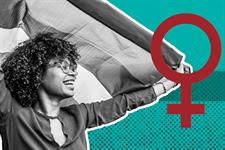
Lesbian and bisexual women and trans people do not feel comfortable being their ‘true selves’ at work, research by LGBTQIA women’s magazine DIVA and Kantar has found.
A poll of 2,101 respondents across the UK, the US, India and South Africa found that while three quarters (73 per cent) of the LBQ+ women and trans individuals agreed or strongly agreed that they could be themselves at work, 11 per cent disagreed or strongly disagreed.
According to the Catalysing Change report, which was commissioned as part of Lesbian Visibility week, 68 per cent of the LBQ+ women and trans individuals interviewed felt comfortable at work, 2 per cent felt unsafe and 9 per cent felt ‘relatively’ safe.
Half of HR and EDI leaders say their organisation provides ‘significant’ support to LGBTQ+ staff – but two thirds have witnessed discrimination, survey finds
Quarter of LGBTQ+ young adults go ‘back into the closet’ after starting work, research finds
Number of trans people who hide their identity at work increasing, poll finds
A further 76 per cent of respondents agreed or strongly agreed that they felt socially accepted at work, compared to 8 per cent who disagreed or strongly disagreed.
Charlotte Woodworth, gender equality director at Business in the Community, told People Management the findings showed “we have a long way to go” before members of the LGBTQ+ community feel truly comfortable at work.
“The fact that some groups don’t even feel safe at work, let alone included or like they belong, is alarming,” she said.
Woodworth said employers must step up efforts to foster respectful, welcoming and safe workplace cultures and environments, adding: “This isn’t just the right thing to do – research shows it also makes good business sense.”
Suki Sandhu, CEO and founder of diversity and inclusion consultancy INvolve, told People Management there was a “clear indication that more needs to be done”.
“The current rhetoric and attacks in the media directed at trans people and LGBTQ+ communities broadly are harmful and can mean that trans and LBQ+ women don’t feel safe, respected or confident in bringing their whole, authentic selves to work,” he said.
“Now more than ever, it’s critical that businesses don’t take their foot off the pedal when it comes to LGBTQ+ inclusion; in fact, they should be using their positions as allies to further embed and enhance efforts to eradicate hate and discrimination in any form and drive positive culture change for trans people and LBQ+ women.”
Sandhu pointed out that business leaders were critical in creating environments where everyone can bring their whole selves to work, and that this should be prioritised at a senior level: “Accountability is key for workplace inclusion, and all employees deserve to work in an environment that is conducive to their success.”
Laura Mackay, chief executive of Just Like Us, an LGBTQ+ young people’s charity, told People Management: “It is extremely disappointing to see that in 2024 there are still so many LGBTQ+ women and non-binary people feeling unsafe and unable to be themselves at work.
“If workplaces want to benefit from the breadth of skills and diverse perspectives among this demographic, then they must do better to ensure they are valued and their needs are met.
“I have no doubt that the anti-LGBTQ+ rhetoric we’re seeing in the UK at the moment, in politics, the media and society as a whole, has an impact on how safe LGBTQ+ people feel at work.”
Mackay added that employers should understand that most LGBTQ+ people will not “assume a place of work to be inclusive” and instead this must be “clearly communicated” to employees.
However, she said: “No organisation is perfect, and part of making employees feel safe is making sure they feel heard. Listening to LGBTQ+ people, encouraging feedback and being open to change is vital.”
The study also found that 74 per cent of LBQ+ women and trans people agreed or strongly agreed that they have the same opportunities to advance as their colleagues, while 13 per cent disagreed or strongly disagreed.
In addition, 12 per cent of LBQ+ women and trans individuals have witnessed or experienced inappropriate homophobic, biphobic or transphobic statements or behaviour at work, and one in 10 (10 per cent) have experienced or witnessed verbal harassment and misgendering of trans persons.
Furthermore, 1 per cent of LBQ+ women and trans people reported experiencing or witnessing physical harassment, while 2 per cent had experiencing or witnessing sexual harassment at work.
Despite this, previous research has found more than half (57 cent) of HR and equality, diversity and inclusion (EDI) managers think their company currently provides ‘significant support’ to LGBTQ+ employees, but almost two thirds (62 per cent) have witnessed discrimination towards sexual minorities at work.
Nancy Kelley, director of Lesbian Visibility Week, said it was “shocking” that, in 2024, more than one in 10 LBQ+ women and trans people will have experienced homophobia, biphobia or transphobia at work, and that “physical and sexual assault is a workplace reality for some of us”.
She added that organisations should maintain a “laser focus” on EDI in the workplace until this “kind of abuse and discrimination is a thing of the past for all of us”.
Browse the CIPD’s resources on sexual orientation, gender identity and gender reassignment
The DIVA and Kantar survey uses the terms ‘lesbian and bi women’ and ‘trans people/individuals’ and People Management has mirrored this terminology



